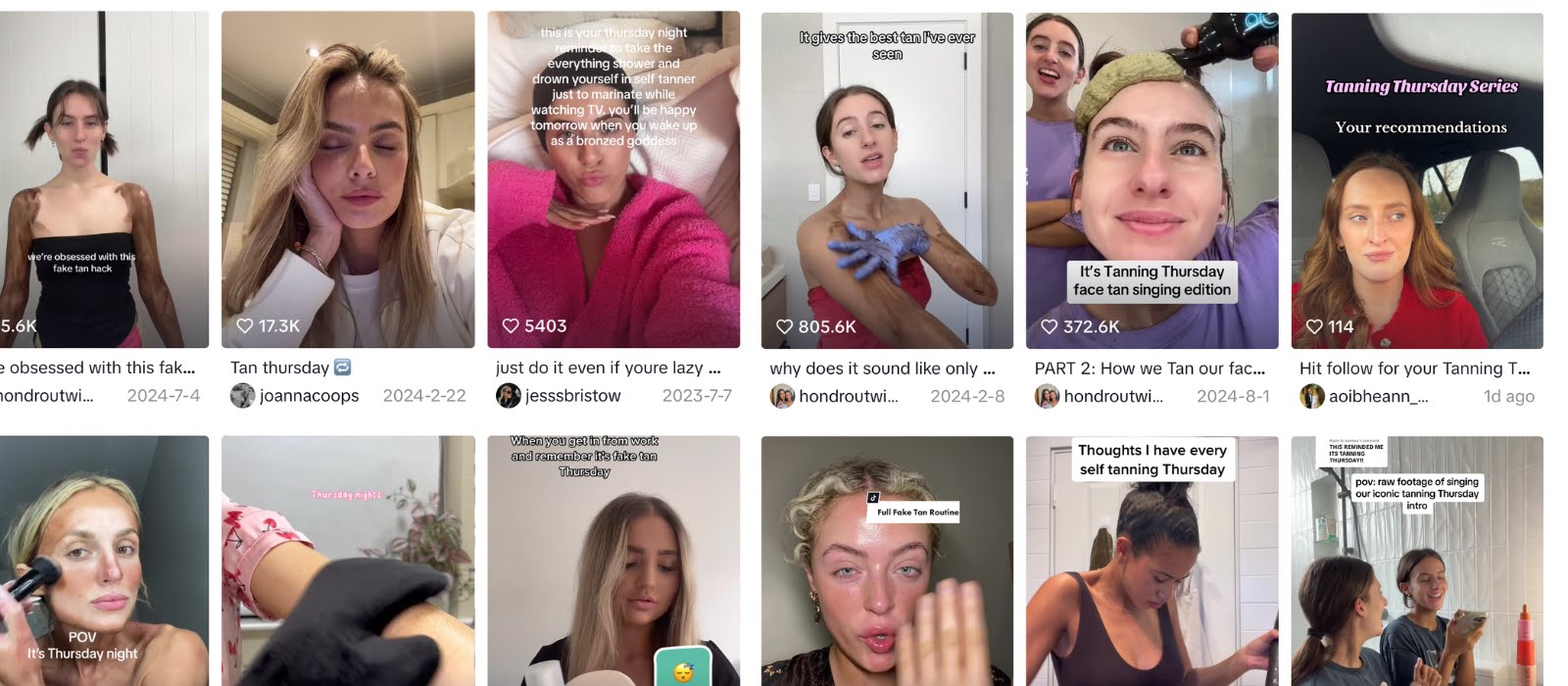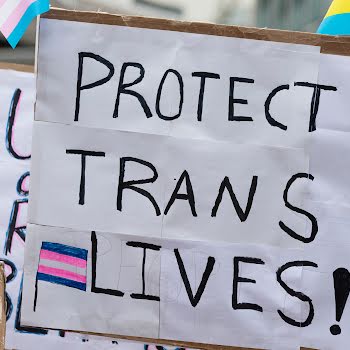With the rise of elaborate skincare routines, pre-bed rituals and ‘#morningshed’ trending on TikTok, Sarah Finnan investigates how modern beauty standards are impacting our sex lives.
I don’t know about you, but I’m hooked on watching videos of people doing things – by which I don’t mean exciting, out-of-the-ordinary things but rather, boring, everyday things such as cooking, cleaning, getting ready for bed. There’s something about watching people go about their daily lives that really appeals to me. I find the monotony soothing, the ASMR of products being opened and closed a lullaby for the soul. The whole thing is kind of perplexing if I’m honest… half the time, I couldn’t be arsed washing my own face and yet, I’d happily spend an entire evening poring over someone else’s favourite wind-down rituals.
There’s one creator I come across regularly on Instagram. I don’t follow her but I engage with her profile every time it pops up so my algorithm has learned to push her content. Each video is essentially the same; she gets up at some ungodly hour and launches into an elaborate morning routine involving hairbands over her ears (for lymphatic drainage, duh), collagen sheet masks, vibrating exercise machines, fistfuls of vitamins, minerals and supplements and a brisk walk with her husband for which she makes a healthful cup of mushroom cacao. All of this happens before 6am. She also manages to squeeze in an at-home Pilates workout, an everything shower and a spot of red light therapy before putting on an entire face of make-up and heading out the door for her 9 to 5. Her life is about as different to mine as possible. But I can’t look away.
At night, I watch endless TikToks of women getting ready for bed. “The uglier you go to sleep, the hotter you wake up,” they smile knowingly as they slug, tan-tour and coil their hair around socks. Come morning time, I’m back for the reveal, hypnotised by them peeling, washing, taking out. If you’re as chronically online as I am, you’ll be well-familiar with the phrase ‘morning shed’, a term coined to describe the process of taking off everything you put on the night before. That could include anything from velcro rollers to silk bonnets, chin straps, lip tints, wrinkle patches and spot stickers. Going to sleep has never been so complicated.
There’s no denying these creators (usually women) look phenomenal—their lips nicely pink, skin plump and hair perfectly coiffed—but it takes a lot to wake up like that and I can’t help but wonder, surely this is impacting our sex lives?! Sorry to go all Carrie Bradshaw on you but it’s a topic I’ve pondered more than once. In fact, I’ve thought about it at least once a day since reading this Dazed article a couple of months ago. “There’s certainly something decidedly unerotic about the way wellness and beauty culture is heading,” journalist Serena Smith writes. And it’s true, our beauty routines have become a non-negotiable part of our evenings – often at the risk of time spent with a partner or potential flame.
While Irish findings are difficult to come by, a report into global sex habits cited by Smith, states that Gen Z is having sex just three times a month. Does that mean we are in the midst of a sex recession? According to this IMAGE article by Kate Demolder, a study published in The Journal of Sexual Medicine in November 2021 found that the pandemic had caused a small but significant diminution in Americans’ sexual desire, pleasure, and frequency. The data echoed a similar study in the UK, called the National Surveys of Sexual Attitudes and Lifestyles (Natsal), which found that with every survey, the average number of occasions of sex per week has decreased: in 1991, respondents said they had sex five times a month. In 2001, this was down to four times per month, and by 2012, the average number was three per month. Results of the latest survey are due to be published this summer, and it will be interesting to see whether modern beauty practices are mentioned as having an impact.
Psychologist and specialist in health promotion from the Health Promotion Research Centre at NUI Galway, Dr András Költo, agrees with the above data. “We’re definitely having less sex. The Health Behaviour in School-aged Children study conducted in Europe, Canada and Central Asia, shows that in 26 out of 33 countries adolescents became less likely to report that they have had sex. While in 2010, every fourth adolescent had had sex by the age of 15 (25%), in 2018 only every fifth told the same (18%).”
Dating coach Frances Kelleher says she hasn’t noticed a correlation between the rise of elaborate beauty rituals and a decline in sexual activity among individuals in Ireland. She does, however, note that women who “don’t fuss for too long over their appearance, find relationships more frequently than women that spend a long time on it”. On the topic of whether we’re having more or less sex, Kelleher says she believes the former to be true. “I think people are having more sex these days, simply because online dating apps exist. You have access to more people and it is much easier to connect now than when we did not have them.” That might be so, but surely such in-depth regimens are having an adverse effect? Maybe it’s as simple as people are doing their bedtime routine after they’ve already had sex, but honestly, I also find that scenario unlikely. Once my head has hit the pillow, I’m not getting up for love, money, nor the promise of glazed doughnut skin.
Professor Caitríona Ryan, consultant dermatologist, co-founder of The Institute of Dermatologists and clinical professor at University College Dublin, says that while it’s not something she’s considered before, it’s definitely feasible that one might have a knock-on effect on the other. “This is such a great question and huge food for thought. I haven’t come across any studies or evidence linking skincare routines to less sexual activity, but I can see how it might happen…I may need to do a study! Some of these modern routines, especially the ones inspired by TikTok trends, can be so time-consuming, leaving less time for intimacy. Plus, there’s the practical side of it—when you’ve spent ages layering serums, moisturisers, or overnight masks, the last thing you want is for it to be rubbed off during kissing or sexual activity.” Preach. I didn’t lather €90 overnight cream on my face for nothing!
Fake tan is another point of contention, especially for Irish women who have a particular affinity for it. “In Ireland, so many women apply their weekly false tan overnight,” Ryan points out. “Sunday night is my fake tan night, and I can tell you my partner absolutely hates it! There’s always the risk of smudging it or, even worse, accidentally tanning parts of your partner’s body or hands. It’s not exactly a mood enhancer. However, I’d argue that self-care and confidence, both of which are often outcomes of skincare routines, can have a positive impact on relationships, particularly sexual ones. Feeling good in your skin is a powerful form of self-assurance, and when people feel more confident, they often project that in their personal and sexual relationships. Self-care is all about balance. Looking after your skin and feeling good about yourself can be great for confidence and relationships, but it’s worth finding a routine that doesn’t get in the way of intimacy with your partner.”
Regarding the role of culture on how we think about sex and intimacy, Ryan says the impact is huge. “We’ve moved from a more traditional, reserved approach to a society where younger generations, in particular, are much more open about relationships, sex, and self-expression. Skincare and beauty routines have become part of this cultural shift. They’re not just about appearance anymore; they’re about empowerment and confidence. But there are funny cultural quirks like the Irish obsession with fake tan. Many women here will sacrifice an evening of intimacy to preserve their tan. These habits can influence how we navigate relationships, but they’re also a reflection of how self-care has become a priority. As I said before, it’s ultimately about balance. Taking care of yourself is important, but it shouldn’t come at the expense of meaningful connection and intimacy. Finding ways to integrate both can make all the difference.”
Ryan makes an interesting point. For many, the difference between indulging in these elaborate routines and skipping them entirely is the difference between confidence and insecurity. A 12-step skincare routine might sound excessive to some but for others, it’s a meaningful way to practice self-love. If you’re drawing fake freckles on your face just because you saw some influencer do it, then perhaps it’s time to question your motivations but if you’re doing it because it genuinely brings you joy, doesn’t that make it an empowering act in and of itself?
According to Dr Költo, countries can be placed on a sexuality “spectrum”. “In many sexually permissive countries, pre-marriage sex is allowed, contraception is easily or freely available, it is relatively easy to access abortion, and children receive comprehensive sex education in schools, including attraction and sexual feelings, sexual and gender diversity, sexual consent and setting boundaries. This is probably why researchers found that sexual permissiveness is closely related to gender equality: the more equal a society – i.e. where women get the same rights and privileges as men – the freer people are to make their own decisions in terms of sex. Of course, cultures change with time and we’ve seen this happen here in Ireland with same-sex marriages and abortion legalised during the last 10 years, reformed sexuality and relationships education and changing public discourse on sexuality.”
Sex and relationship coach and accredited psychotherapist Audrey Casey McCormack says that while she doesn’t know of any research about the impact of modern beauty routines on relationships, it is something that people often mention in their sessions with her. “I get a lot of clients complaining about sex being off the table when their partners put on fake tan or how unsexy the heatless hair rollers are,” she tells me. Another big issue? Phone usage. “A common difficulty that I’m seeing more of is in relation to phones, watching TikTok or scrolling before bed rather than talking or cuddling. I do think this is causing a sexual recession.”
Ultimately, the magic happens somewhere in the in-between. Nothing kills the mood quite like the pungent odour of fake tan but for many, it remains an integral element of their confidence toolkit. Essentially, the interplay between modern beauty rituals and intimacy boils down to balance and finding a middle ground that doesn’t let TikTok trends replace the warmth of human connection. Whether it’s prioritising time with your partner over tinting your eyebrows or embracing rituals that make you feel good without sidelining intimacy, the key is in aligning self-care with shared moments. After all, glazed doughnut skin is satisfying, but so is spooning.




















